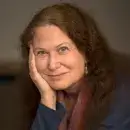
Ms.
Jane Hirshfield
Independent
Area
Humanities and Arts
Specialty
Literature
Elected
2019
Jane Hirshfield is the author of ten poetry books, including The Asking: New and Selected Poems (Knopf, 2023); Ledger (Knopf, 2020); The Beauty (Knopf, 2015); Come, Thief (Knopf, 2011); and Given Sugar, Given Salt (HarperCollins, 2001). She is also the author of two essay collections investigating the deep structures by which poetry embodies and broadens the experienced world, Nine Gates: Entering the Mind of Poetry (HarperCollins, 1997)and Ten Windows: How Great Poems Transform the World (Knopf, 2015). Additionally, Hirshfield is the editor/co-translator of four books collecting the work of world poets from the deep past. Her honors include fellowships from the Guggenheim and Rockefeller foundations, the National Endowment for the Arts, and The Academy of American Poets; the California Book Award and Poetry Center Book Award; and best book of the year selections from The Washington Post, San Francisco Chronicle, and England’s Financial Times. A former chancellor of The Academy of American Poets, Hirshfield’s poems appear in The New Yorker, The Atlantic, The Washington Post, The Times Literary Supplement, The Guardian, The New York Review of Books, Poetry, and ten volumes of The Best American Poetry. In 2017, in conjunction with the March for Science in Washington D.C. and Kent State University's Wick Poetry Center, she founded Poets for Science, an online and traveling interactive installation that has been on display at the National Academy of Sciences, The Broad Institute, Vanderbilt University, The Natural History Institute, and the American Geographical Union annual meeting, among other venues. In 2022, she was the Seamus Heaney Visiting International Poet at Queens University, Belfast.
Hirshfield's work addresses essential elements of human experience: desire and loss, impermanence and beauty, the many dimensions of our connections with one another and the recognition that our existence is not separate from other beings amid the human and natural world. The New York Times characterizes her poetry as "radiant and passionate," The Washington Post has named her “among the modern masters,” Czesław Miłosz has praised her “profound empathy for the suffering of all living beings,” and Rosanna Warren calls her work, "a sensuously philosophical art." Jane Hirshfield's poetry knows the value of compression, implication, and surprise. Her essays are alert to both science and ethics, while her exemplary translations make possible cross-cultural dialogue and global exchange. Her art, vital and necessary, is a significant ambassador for the virtues of seeing in ways at once clear and complex, for the necessity of the practice of imaginal freedoms, and for the articulation of both our particularity and our shared fates.
Last Updated